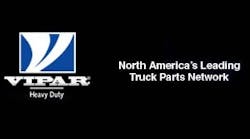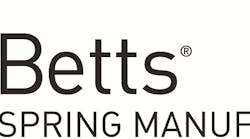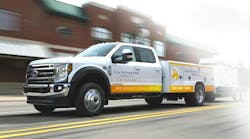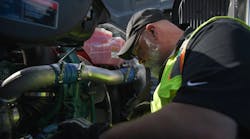You’ve heard it before – the anecdotes about “Millennials.” Countless articles have scrutinized how this group of younger adults tends to carry heavy student loan debt, live at home longer and profess a passion for avocado. This is the generation that was born roughly 1982 to 2004 (The boundaries of each ‘generation’ are blurry and are often drawn by conflicting media accounts). Millennials largely came of age having had access to the internet, social media and smartphones.
Just as the Greatest Generation passed the torch to Baby Boomers, and Baby Boomers to Gen X, Millennials are the latest group to enter the workforce. As such, it becomes interesting to examine what makes this generation tick and speculate how they might contribute to legacy professions, like trucking and vehicle maintenance and repair.
The Rumors
Millennials are job hoppers who change jobs every few years. Millennials have a tough time with criticism and often need some hand-holding to get the job done. They like to ask, “What’s in it for me?”
To elaborate further, this group of people who just finished or were in the process of finishing school when the housing bubble burst are cautious. They generally prefer to know the ‘why’ of things and they long to spend their days engaged is work that is meaningful to them and to others. They like to learn – constantly – and they see the value in relationships and mentorships.
Many of the character traits we ascribe to Millennials – good and bad – could actually serve them well in this line of work.
“I think like all generations, you can have a stereotype and there are people that fall 100 percent in that stereotype, and then you have people who are outliers,” says John Devany, general manager of Betts Company (http://www.betts1868.com), a six-generation family owned and operated business with three operating divisions: Betts Truck Parts & Service, Betts Spring Manufacturing and Betts HD.
In his experience, Devany found Millennials are motivated differently than their predecessors. “With the Millennials, sometimes they want to know ‘What’s in it for me?’ ... and so you have to explain yourself a little further,” he points out.
Jane Clark is vice president of member services with NationaLease (www.nationalease.com), an association of 150 independent leasing companies throughout the U.S. and Canada. Clark believes some of the stereotypes attributed to this group may in fact work to the benefit of the industry as it evolves.
Clark says, “One of the things we hear is that [Millennials] want to feel they’re a part of something. Honestly, I think that’s a benefit because if they do feel like they’re a part of something, they tend to be more loyal over time. We hear that they’re job hoppers, and I think they somewhat are, but they’re really motivated by meaning. Meaningful work. Feeling like they’re part of something bigger than themselves …like they’re helping others. If we can tap into that motivation we can get some really loyal employees.”
One of the negative traits attributed to Millennials is that they need hand-holding. Put in a more positive light, the message is this: Millennials value mentorships. They are hungry to soak up the wisdom and experience of successful professionals in the field.
“They’re very willing to have that mentor relationship, and it’s a great way to actually work together,” Clark says.
Many of the NationaLease member companies pair Baby Boomers who do the hands-on wrenching with younger workers with an aptitude for diagnostics and technological repairs.
In similar fashion VIPAR Heavy Duty (https://www.vipar.com), a network of independent aftermarket truck parts distributors, advocates for understanding the differences between each generation of workers and fostering an environment that both identifies and celebrates each group’s strengths.
“It also involves creating opportunities for each generation to connect with one another,” says VIPAR Vice President of Marketing Jeff Paul.
VIPAR is a sponsor of the GenNext program (https://gennext.com), a new group in the heavy duty aftermarket that aims to educate, mentor and recruit the next generation of aftermarket leaders.
A Shift from Mechanical to Technical
The truth is, Millennials might particularly enjoy the unique combination of an outside-the-cubicle, work-with-your hands career that also involves mastering complex and ever-changing technology.
Like so many industries, fleet maintenance and repair is become technology driven. It’s a natural progression for the heavy duty trucking industry and its future workforce. Adults who are graduating college, finishing trade schools and climbing the rungs are undeniably more technologically adept than previous generations.
“Technology is one of the key drivers in our future growth plans,” says VIPAR’s Paul. “We see that as a key differentiator, especially as our distributors service the needs of Millennials. For example, we believe electronic commerce will continue to grow as more Millennials enter the heavy duty aftermarket.”
Trucks are essentially becoming computers on wheels. They are filled with computers, diagnostic codes and sensors that all work together to make transporting goods a safe and efficient endeavor.
Clark with NationaLease says, “There’s a lot of connected data we’re looking at. For example, the electronic logging devices that many fleets are currently using will become mandatory. They will monitor hours of service but also driver behavior and telematics.
“Even on the back office side, there’s so much more information fleets are able to tap into through various automated web portals and things that will provide them data, consolidate data and allow [maintenance managers] to make decisions based on their entire fleet – things like understanding maintenance costs per unit,” says Clark.
She adds that in most cases, there are very few repairs today’s technician can do without plugging the truck into diagnostic software.
“It’s much different than when we relied on people to bang on something and listen to the sound it made, or listen to the engine and know what those things meant,” Clark says.
Thomas Naylor, a shop foreman (and a Millennial) at Zimmerman Truck Lines says, “If working in the trucking industry for the last 10 years, [this] generation has pretty much watched and worked through the mechanical to electrical transition, to where we are today with everything being software-related somehow.”
Zimmerman Truck Lines (ztlinc.com) is a dry van and flatbed carrier.
“We have seen the … beginning of a new age when it comes to trucking,” he says. “I don’t believe there is a technician shortage. I believe there is a shortage of technicians that want to work. The Millennial generation is responsible for building up future generations of technicians. There are plenty out there; they just need to be motivated.”
Sell them the Industry
Part of attracting new blood to trucking has a great deal to do with education and exposure. Few people really know what it means to work with today’s fleets.
“Most of us think of that guy who’s climbing underneath a truck and has dirt under his fingernails,” NationaLease’s Clark says. “That’s not really what it is now. If you walk into a lot of shops they’re sparkling clean and there’s tons of computer equipment in there. Sure, you’re going to have to get under a truck. There’s no substitute for that. But it’s not the dirty, greasy, grungy job I think it’s always portrayed as being.”
Young workers in the U.S. are more likely to be college graduates than ever before. According to a Pew Research Center analysis of data from its monthly Current Population Surveys, four-in-ten Millennial workers ages 25-29 had at least a bachelor’s degree in 2016. With this emphasis on a four-year education, many trades need to work harder to grab the attention of prospective maintenance professionals.
Sometimes it’s not just the students who could use an update, but the teachers, too.
“We’re volunteering our time and in some cases we’re on boards where we’re helping to educate professors and instructors of what these new diesel Class 8 trucks are coming equipped with; [such things] as collision mitigation, GPS navigation, etc.,” Devany with Betts says. “Right now it appears a lot of youth are embedded in that technology boom, and we’re trying to educate them that it’s in our industry, too.”
Clark with NationaLease says, “Right now, I think [it’s essential to] do as many things as you can, as often as you can, to stay visible in the marketplace. It’s a tough challenge.”
The Recruiting Challenge
A number of things contribute to the difficulty in recruiting. The Boomers are retiring, but at the same time, the demand for technicians has grown.
Clark of NationaLease has found the biggest recruiting challenge is luring diesel technicians to the industry. Because of this, NationaLease partners with technical institutes throughout the country to educate about the industry. The company also provide webinars as a resource for recruits and has added functionality to its website to help in the job search. Posted jobs appear on NationaLease.com but also on Indeed.com and other aggregator sites.
At VIPAR, Paul says, the company promotes employment opportunities via social media in the heavy duty aftermarket, in addition to partnering with the local Northwood University’s internship program each year to facilitate Heavy Duty Aftermarket Week (HDAW), a large North American gathering of the independent heavy duty aftermarket industry.
Northwood University (www.northwood.edu) is a private university that specializes in managerial and entrepreneurial education.
“It is just as hard to find a good technician as it is a good driver, and recruiting a technician is different than recruiting a driver,” says Naylor at Zimmerman Truck Lines.
He says he will usually go after a younger technician, fresh out of school or with little experience, and then send them on to Paccar school and state inspection classes, plus help them to get their CDL.
PACCAR (www.paccar.com) is a global leader in the design, manufacture and customer support of high-quality premium trucks.
“A young technician doesn’t have many bad habits yet and they are willing to learn more,” Naylor says. “At that point, you teach them how you want things done, get them experience and build their confidence.”
Many companies, like the family-owned and operated Betts, believe in training employees and retaining them all the way into retirement. Does this clash with the idea that Millennials are purportedly chronic job changers? Or can a compromise be achieved?
Betts’ Devany says it’s not quite as easy to retain this demographic. As such, his company looks to strategically find and retain those employees who will stick around.
“We’ll go to the junior colleges or community colleges and high schools in our Fresno [CA] community to educate … about opportunities in [manufacturing and trucking],” he says. “What we found is that not a lot of people are educated about trucking and transportation. We’re trying to educate the youth so that when they do come ready to enter the workforce, they’re thinking of our industry as an opportunity.”
What does this boil down to? “Slacker” companies that cannot see beyond the daily grind and that do not actively strive to meet future goals or establish a clear career path for its workers need not recruit. Because if that’s the case, qualified Millennials may be slow to apply.
A Perfect Fit?
A final talked-about quality of Millennials is that they may be far more open to change than previous generations – a trait that bodes well in a fast-changing field such as fleet maintenance.
“As our industry rapidly evolves, this generation will adapt quickly,” VIPAR’s Paul says. “They have been raised at a time when productivity in the U.S. is at an all-time high. As a result, they understand that expectations will be high, and they need to be innovative in how they attack challenges.”
The torch is passing hands. Millennials will help to issue in the next generation of workers for fleets. Their efforts will be informed by skilled mentors who carry with them valuable hands-on experience, and their contributions will be guided by the promise of future innovation.




